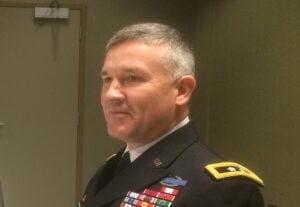Army Confidential: Service Seeks Private Dialogue With Companies
Posted on

HUNTSVILLE, ALA.: Can we talk? In private? If you’re a defense contractor with a good idea, the US Army wants to say yes — but laws and regulations get in the way. That’s a problem the Army Capabilities Integration Center (ARCIC) is struggling to solve with what it calls a Capabilities Information Exchange.
Here’s the circle ARCIC’s trying to square. When discussing future technologies and military requirements, each company naturally wants to talk to the government customer one-on-one, with none of its competitors present. That way you can ask questions and suggest solutions freely, without tipping your hand to reveal your company strategy or proprietary information.

Maj. Gen. Robert “Bo” Dyess
“They do not want to discuss… the secrets to making profit… in an open forum, and the Army is sensitive to that,” Maj. Gen. Robert “Bo” Dyess told reporters at the Association of the US Army conference here. Dyess is the acting chief of ARCIC, replacing H.R. McMaster, who’s now Trump’s National Security Advisor.
Government benefits because it gets a better reality check on what industry can actually deliver — and whether the Army is asking for the impossible.
“This is really a critical conversation,” said Ellen Lord, CEO of Textron, speaking to AUSA. “We often don’t have the conversation about, (for example), ‘These three parameters are mutually exclusive, so here are the trades we have. What’s more important?’…We’re wasting time and money when we don’t that.”

Ellen Lord
But the acquisition system is not set up to save time and money. It’s set up to prevent potential “waste, fraud, and abuse” — sometimes even if the cure is much more costly than the disease. Any one-on-one interaction with a particular company raises the possibility someone is getting special access. Any perception of preferential treatment at any point can be grounds for protesting a contract award, which holds up a program for an absolute minimum of 40 days, even if GAO dismisses it as fast as possible.
“When it gets to programs of record….we do have to make sure everybody knows the same things,” said Steffanie Easter, the acting Army procurement chief, also speaking at AUSA. “A stamp” — or nowadays one email — “that’s all it takes for someone in industry to feel that they did not get a fair shot and drop a protest on us, because they saw me talking with somebody and I didn’t talk to them, or they think that I told one (company) something I didn’t tell the other.”
So the standard, somewhat stilted solution is to bring in all interested companies together, give them the same canned briefing, make them ask their questions in front of each other, give them the answers, and send them home. As for industry participation in any other venue, the lawyers’ default answer is, when in doubt, kick them out. This puts a real crimp in industry-government interaction.
“Remember when we were at William & Mary and I said that industry could not attend breakout sessions?” Maj. Gen Dyess said when I raised the topic. Dyess is referring to last August’s Army Innovation Summit in Williamsburg, Va., when a last-minute ruling by Army lawyers forbade industry attendees from participating in small group discussions alongside military officers and civil servants.

Steffanie Easter during an Army Network Integration Evaluation at Fort Bliss, Tex.
It was Dyess who got to stand up before the whole conference, including his four-star superiors, and explain what happened. But out of that frustrating experience, Dyess said, ARCIC has come up with two new approaches. One is a venue for small business known as the Forum for Innovative Novel Discovery. There’s a FIND forum here at the Association of the US Army’s Global conference, with six companies participating, he said. The second, larger forum is the Capabilities Information Exchange (CIE), which brings in industry to discuss the Army’s shortfalls, or “capability gaps,” and how TRADOC should write requirements for what future capabilities are needed.
The first CIE occurred in December at Fort Eustis, Va., but the conversation was still more restricted than Dyess wants. There was a big briefing for all attendees in the morning — “if you had been to any industry days, it would probably be sort of the same kind of information,” Dyess said — and then a classified session in the afternoon for industry reps with appropriate clearances to get more detail.
“I don’t think that necessarily satisfied all of them,” Dyess said. “What they would really like to do is have a session in which they could go in proprietarily — industry, government, acquisition, resourcing (all) together — to ask specific questions they do not want to talk about in a large open forum…. That is the direction we’re going to go in.”
How? Well, ARCIC is still working that out. There has to be a “broad and open” invitation to all comers, in order to avoid favoritism, Dyess said, but each company which responds should get the opportunity for a private meeting with the Army. “We’ve got to determine how we’re going to bring them in individually to ask their proprietary questions,” he said. “That’s our challenge.”
“We’re going to do another one in August,” said Dyess, a second Capabilities Information Exchange that delves deeper into the Army’s gaps. First, though, ARCIC will put a public announcement on the FedBizOpps website: That’ll be the requisite “broad and open” invitation, which Dyess expects to come out in May or June. By then, he’ll need to have all the lawyers in line on exactly how to hold the private conversations that industry and the Army both want.
Subscribe to our newsletter
Promotions, new products and sales. Directly to your inbox.
